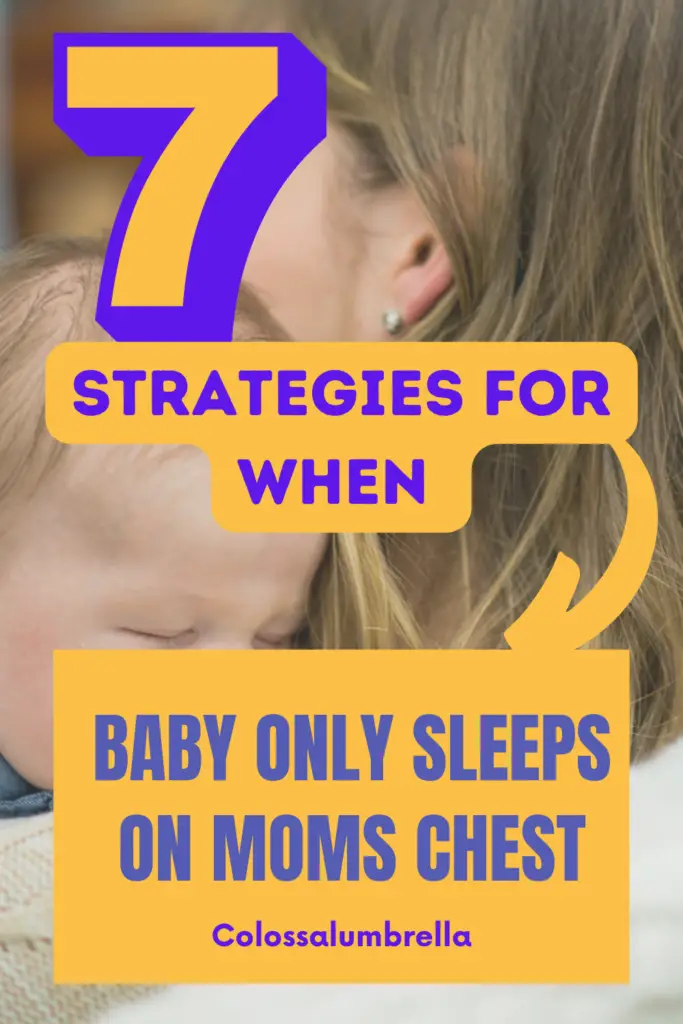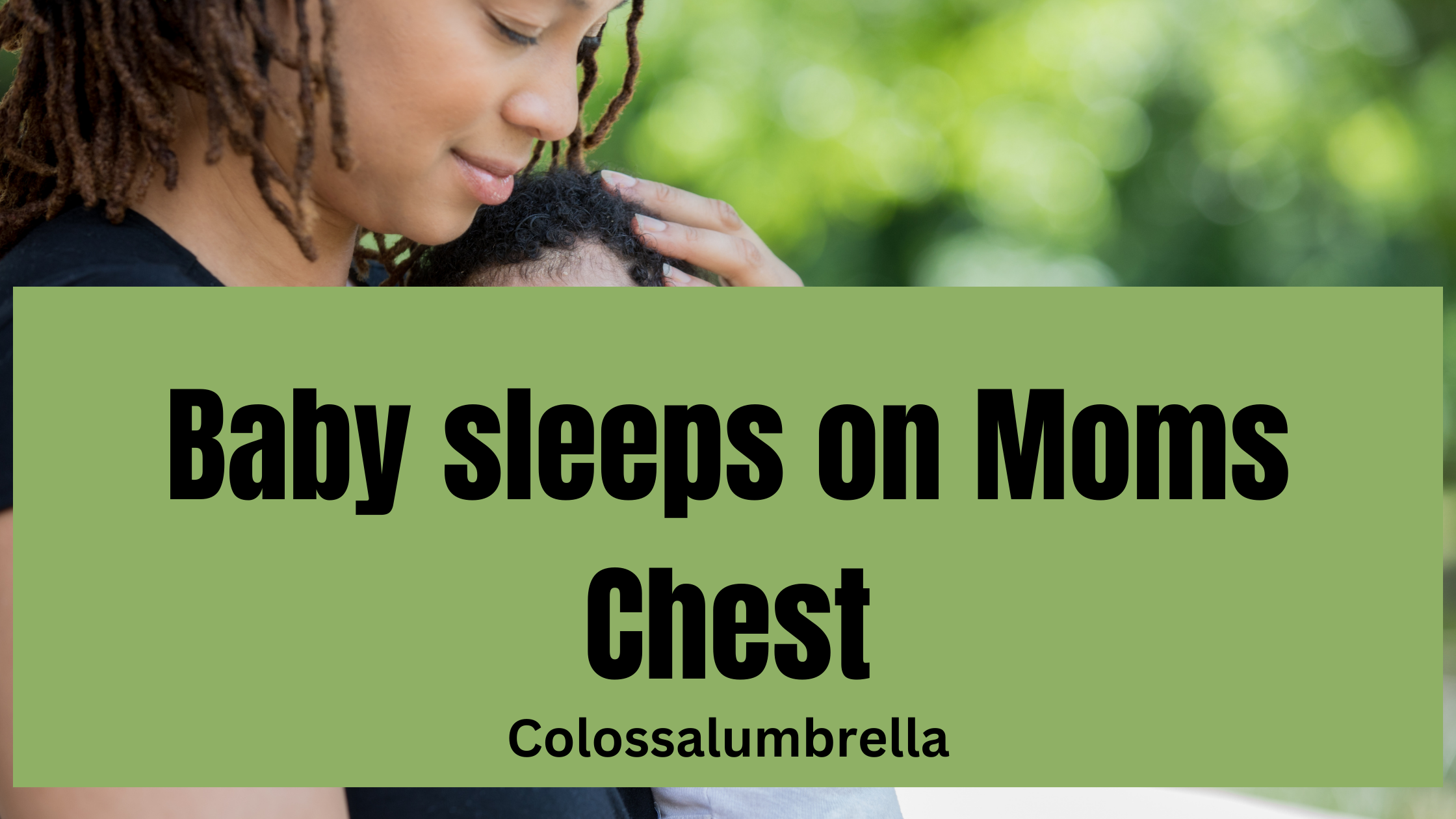Contents
Becoming a parent is a beautiful and transformative experience, but it also comes with its fair share of challenges. One of the most common struggles that parents face is when their baby will only sleep on their chest. This can be incredibly exhausting and frustrating, leaving parents feeling overwhelmed and desperate for a solution. In this blog post, we will explore the reasons why baby will only sleep on my chest, the potential dangers involved, and most importantly, we will provide tips and strategies to help transition your baby to independent sleep.
Baby will only sleep on my chest – 4 Reasons
Babies are naturally drawn to the warmth, comfort, and familiarity that being held on their parent’s chest provides. There are several reasons why babies may prefer this sleep position:
Sense of Security
When a baby is held on their parent’s chest, they feel safe and secure. The gentle pressure and constant contact mimic the feeling of being in the womb, which is comforting to them. This closeness also allows them to hear the familiar sound of their parent’s heartbeat, which is soothing and reminiscent of their time in the womb.
Familiar Scents and Sounds
A baby’s sense of smell is highly developed, and they are able to recognize and find comfort in the scent of their parent. When they sleep on your chest, they are surrounded by your familiar scent, creating a calming environment for them. Additionally, the sound of your breathing and voice can be soothing and help them relax into sleep.
Temperature Regulation
Newborns have difficulty regulating their body temperature, and being held on your chest provides them with the warmth they need to feel comfortable. Your body heat helps to keep them cozy and can contribute to a more restful sleep for them.
Sense of Presence
Babies have limited eyesight in the early weeks of life, and being on your chest allows them to easily see your face when they wake up. They feel reassured by your presence and can quickly make eye contact with you, which provides a sense of security and connection.

The Potential Dangers of baby sleeping on moms chest
While it may be tempting to let your baby sleep on your chest to ensure a few moments of rest, it’s important to be aware of the potential dangers involved. These include:
- Risk of SIDS – The risk of Sudden Infant Death Syndrome (SIDS) increases when a baby sleeps in an unsafe sleep environment, such as on their stomach or with a parent. It’s crucial to follow safe sleep guidelines to reduce the risk of SIDS and create a safe sleep environment for your baby.
- Accidental Falls – Falling asleep with your baby on your chest poses a risk of accidental falls. As a sleep-deprived parent, it’s easy to doze off unintentionally, which can lead to dangerous situations. It’s important to prioritize your own sleep and find alternative ways to help your baby sleep independently.
7 Strategies to Transition Your Baby to Independent Sleep
Now that we understand the reasons behind baby sleeping on your chest and the potential risks involved, let’s explore some strategies to help transition your baby to independent sleep:
Swaddling – Swaddling can provide a sense of security and mimic the feeling of being held. It helps restrict your baby’s movements, preventing them from startling themselves awake. Experiment with different swaddling techniques and find the one that works best for your baby.
Create a Sleep Routine – Establishing a consistent bedtime routine can signal to your baby that it’s time to sleep. Incorporate calming activities such as a warm bath, gentle massage, or soothing lullabies. Consistency is key, so try to follow the same routine every night.
Use White Noise – White noise machines or apps can create a soothing and consistent background sound that helps drown out other noises and promotes better sleep for your baby. Experiment with different sounds, such as ocean waves or soft rain, to find what works best for your little one.
Gradual Transition – Instead of abruptly placing your baby in their crib, try a gradual transition approach. Start by holding your baby until they are in a deep sleep and then gently transfer them to the crib. Gradually increase the time they spend in the crib until they can sleep independently.
Safe Sleep Environment – Ensure that your baby’s sleep environment is safe and conducive to sleep. Use a firm and flat mattress, remove any pillows, blankets, or stuffed animals, and keep the room at a comfortable temperature. Following safe sleep guidelines will help reduce the risk of SIDS.
Offer Comforting Items – Introduce comforting items such as a lovey or a pacifier to help soothe your baby during the transition to independent sleep. These can provide a sense of security and familiarity, making it easier for them to settle down.
Seek Support – If you’re feeling overwhelmed or struggling to transition your baby to independent sleep, don’t hesitate to seek support from a pediatrician or a sleep consultant. They can provide guidance tailored to your baby’s specific needs and help you develop a plan that works for your family.
Conclusion
While it can be challenging when your baby only wants to sleep on your chest, there are strategies you can implement to help transition them to independent sleep. Understanding the reasons behind this preference and being aware of the potential dangers involved is crucial for creating a safe sleep environment for your baby. By following safe sleep guidelines, establishing a bedtime routine, and using comforting techniques, you can gradually help your baby develop healthy sleep habits. Remember, seeking support when needed is always an option, and with patience and consistency, you can overcome this sleep struggle and help your baby sleep soundly on their own.
Disclaimer: The content of this blog is for informational purposes only and is not intended to be a substitute for professional medical advice, diagnosis, or treatment. Always seek the advice of your physician or other qualified healthcare providers with any questions you may have regarding a medical condition.
I would stay connected and keep you updated with parenting tips, pregnancy guides, creative ideas, easy crafts, and Free Printables. Subscribe to Colossalumbrella to get new ideas delivered to your inbox. Follow me on Facebook, Pinterest, Twitter, and Instagram.
